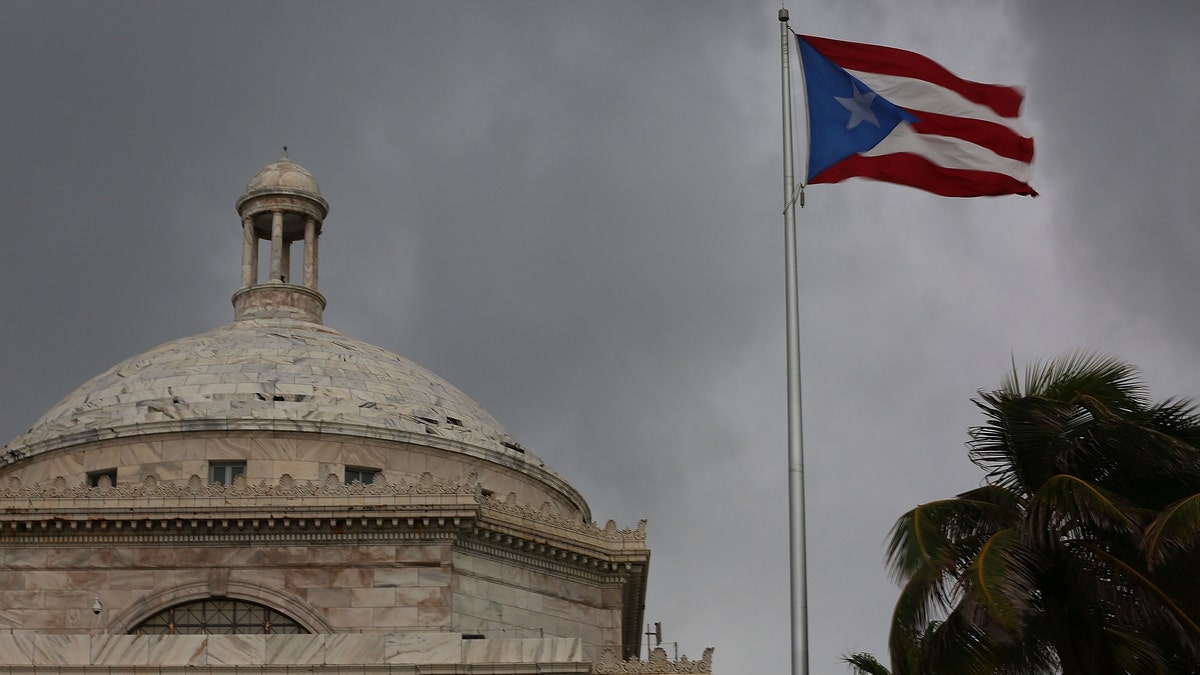
SAN JUAN, PUERTO RICO - JULY 01: The Puerto Rican flag flies near the Capitol building as the island's residents deal with the government's $72 billion debt on July 1, 2015 in San Juan, Puerto Rico. Governor of Puerto Rico Alejandro GarcÃa Padilla said in a speech recently that the people of Puerto Rico will have to make sacrifices and share the responsibilities to help pull the island out of debt. (Photo by Joe Raedle/Getty Images) (2015 Getty Images)
Last week, the Puerto Rican Government walked away from a consensual deal with the bondholders of its electric power authority, PREPA, in hopes that this will further its aim to attain unprecedented bankruptcy powers. This walkout followed press reports of the Commonwealth’s cancellations of meetings with its other creditors.
Puerto Rico’s leaders claim that they need Washington, D.C., to “force bondholders to the table,” but their actions don’t reflect this. Instead, they’re engaging in a campaign of disinformation about the level of debt and recrimination of bondholders that seems aimed at pressuring Washington to give them bankruptcy authority that would be without precedent.
When Congress rejected the Obama Administration’s push to include its Super Chapter 9 plan for Puerto Rico in last December’s omnibus bill, it rightly took a stand for seniors, retirees and other municipal bondholders across the country.
As has been established by members of Congress and admitted by the island’s own governor, Puerto Rico’s bondholders are largely ordinary American citizens (on and off the island) who invested their retirement savings in Puerto Rican bonds.
In fact, according to Sen. Charles Grassley, nearly 60 percent of Puerto Rico’s debt is held by ordinary Americans. There is no doubt that some made this decision after consulting with investment advisers. Many others, like myself, made this careful and calculated decision on our own. All of us, I suspect, did it for similar reasons.
- Borinqueneers: Puerto Rico’s Forgotten Heroes
- Misery deepens for those in Puerto Rico who can’t leave
- Puerto Rico Prepped for Invasion of Caimans
- Murals, makeshift movie houses mark revival of neighborhood in San Juan, Puerto Rico
- Homelessness On The Rise In Puerto Rico
- Mass wedding in Puerto Rico celebrates gay marriage
- Puerto Rico, Drug Corridor to the US
- New regulation in Puerto Rico allows for use of medical marijuana
- Hispanics expected to show support for Ron Rivera, Panthers at Super Bowl 50
Puerto Rico’s debt has long been considered one of the nation’s best retirement investments due to its tax-exempt status and, importantly, because, like state debt, some of it comes with constitutionally-backed “full faith and credit” guarantees of payment.
For their part, Puerto Rico’s leaders have long encouraged this investment. Even when things began looking bleak for Puerto Rico’s economy in 2013, Gov. Alejandro García Padilla pledged, “We will do everything – and I repeat, everything – that is necessary for Puerto Rico to honor all its commitments. It's not only a constitutional but also a moral obligation."
For the governor especially, talk is cheap. Instead of following through on his pledge, García Padilla has waged a two-year campaign pitting the Puerto Rican people against “greedy” bondholders, despite the fact that so many of the bondholders are Puerto Rican residents themselves.
The governor has neglected to make any fundamental changes to Puerto Rico’s broken economic model, failed to create any new revenue for the island outside of tax increases and refused to cut spending or balance the budget – all while spending hundreds of millions of dollars on lobbyists and lawyers to push for a bailout on the backs of bondholders.
Treasury Secretary Jacob Lew, despite aiding the governor in his quest to wipe out bondholders, last week made clear to the leadership in San Juan that there will be no taxpayer bailout for Puerto Rico. As it deliberates in accordance with Speaker Paul Ryan’s pledge for congressional action by the end of March, Congress should extend Lew’s promise and reinforce bondholder protections, as well.
Those of us who invested our retirement and savings in Puerto Rico’s constitutional debt played no part in the Commonwealth’s fiscal impropriety. We bought the island’s highest-priority bonds in accordance with long-respected and legally-backed protections, following the urging of Puerto Rico’s own government.
Undoubtedly, Congress has and will continue to consider a great many options on how best to act on Puerto Rico. Ideally, a solution will see the Commonwealth curtail its wild and out-of-control spending practices and, most importantly, finally negotiate in good faith with its bondholders.
But Congress must not, under any circumstances, pass legislation that allows Puerto Rico to declare bankruptcy – which is something that no other state has the authority to do.
Allowing Puerto Rico to declare bankruptcy sends a clear message to retirees and savers like me who have invested in full faith and credit bonds: None of your investments are safe, and you can no longer count on the rule of law to protect you.








































